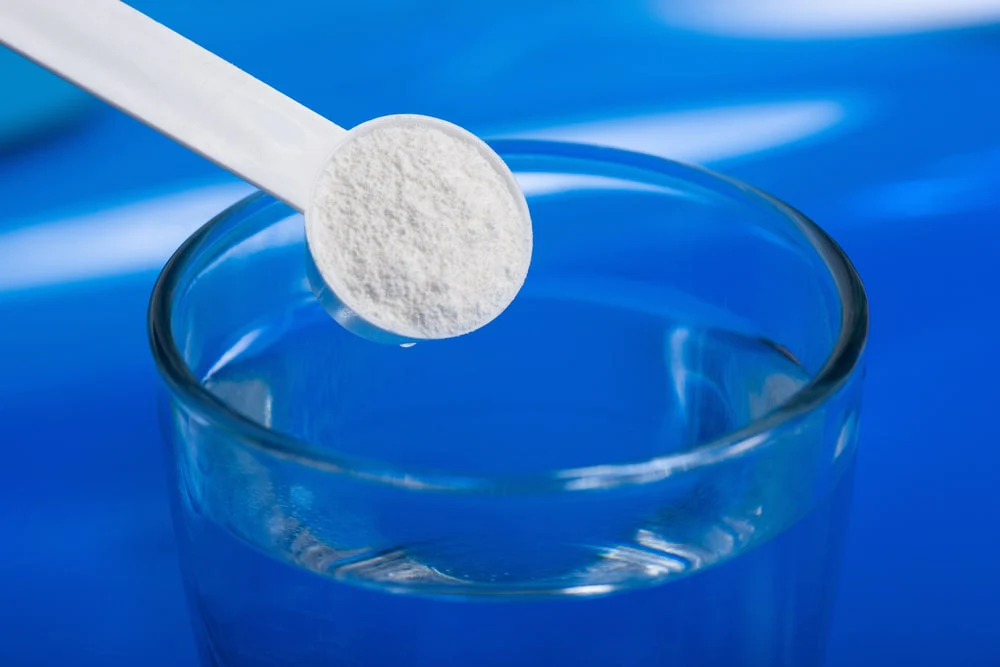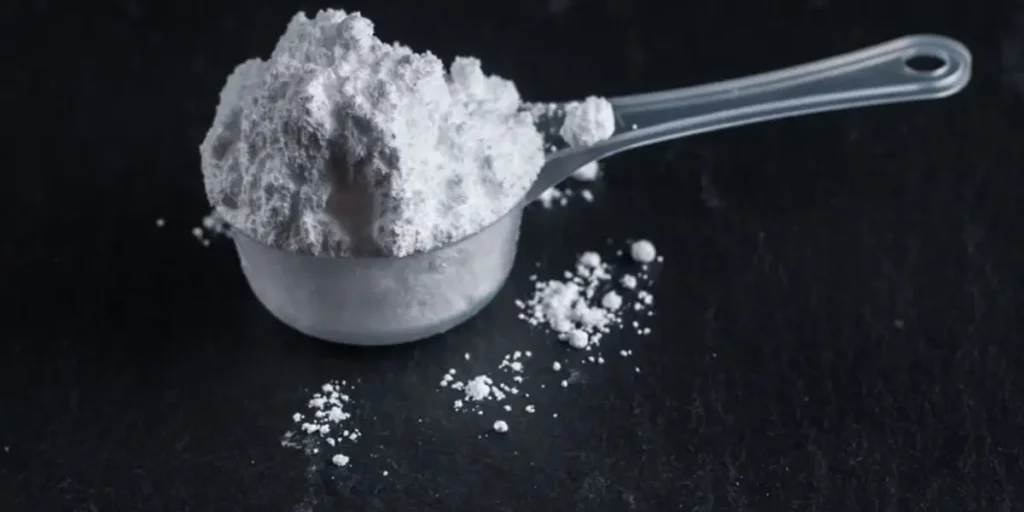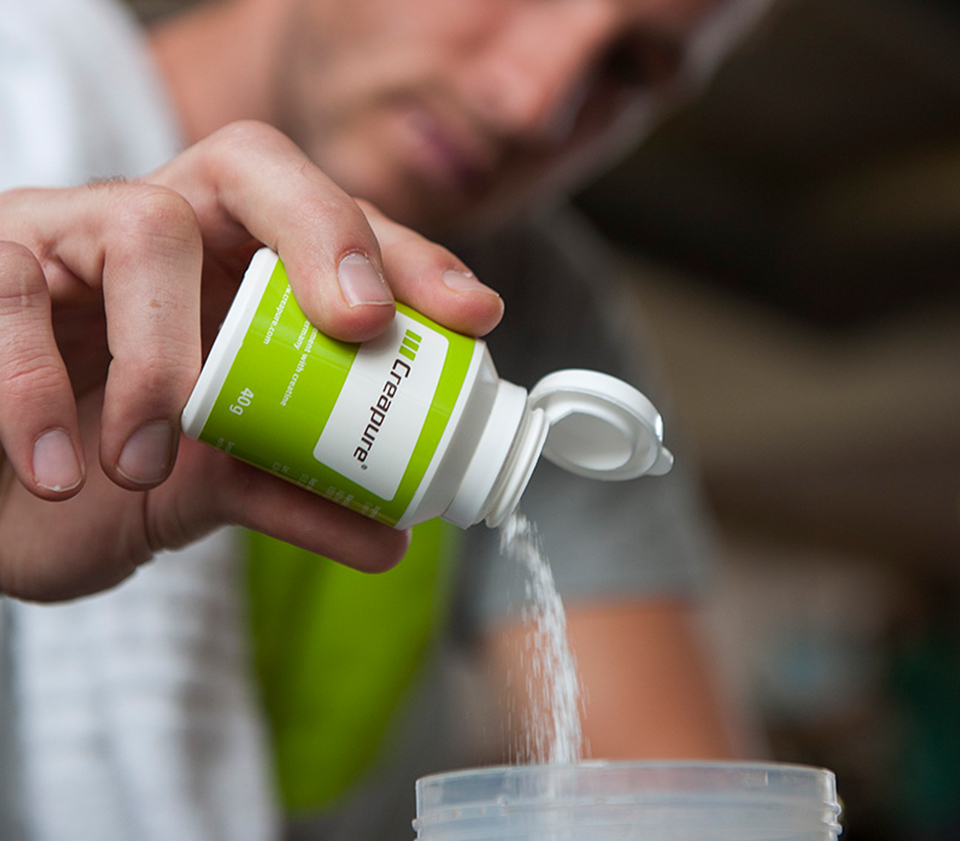Yes, creatine is highly soluble in water. Creatine is a naturally occurring compound found in small amounts in certain foods and synthesized by the body.
Many people use creatine as a dietary supplement to enhance athletic performance, particularly in activities that require short bursts of intense energy, like weightlifting and sprinting.
Creatine monohydrate, which is the most common form of creatine used in supplements, readily dissolves in water.
Furthermore, this solubility makes it easy to mix creatine powder into beverages such as water or juice. When you mix creatine with water, it should dissolve fairly easily, leaving you with a clear or slightly cloudy solution, depending on the concentration.
It’s important to note that creatine can degrade over time when exposed to heat and moisture, so it’s best to store creatine supplements in a cool, dry place to maintain their effectiveness.
How does creatine dissolve in water?

Creatine is a naturally occurring nitrogenous organic compound found in small quantities in certain foods, primarily in red meat and fish, and is also synthesized within the human body.
Chemically, creatine is classified as a guanidine compound, consisting of three amino acids: arginine, glycine, and methionine.
Moreover, it plays a crucial role in the production and storage of energy, particularly in activities that require short bursts of intense effort, such as weightlifting and sprinting.
Creatine is stored in muscles and is used to regenerate adenosine triphosphate (ATP), the body’s primary energy currency.
Demonstrating creatine’s high solubility in water
Creatine supplements typically use creatine monohydrate as the active ingredient. Creatine monohydrate is a crystalline powder form of creatine.
It is one of the most well-studied and widely used forms of creatine supplementation due to its high solubility, bioavailability, and effectiveness in increasing muscle creatine stores.
How creatine readily dissolves in water
Creatine monohydrate dissolves in water due to its excellent water solubility. This property allows for easy mixing when preparing creatine supplements.
When you add creatine monohydrate powder to water or any other liquid, it quickly disperses and dissolves, forming a solution.
The dissolution process is aided by the fact that creatine monohydrate particles are very fine, which increases their surface area and enhances solubility.
Appearance of creatine solution in water: When creatine monohydrate is dissolved in water, it typically results in a clear or slightly cloudy solution, depending on the concentration.
Furthermore, the solution should appear uniform without any visible particles or sediment, indicating that the creatine has effectively dissolved.
This dissolved creatine solution is easy to consume and can be mixed with other beverages or consumed as a standalone drink.
What affects creatine solubility?
Temperature can affect creatine solubility, with higher temperatures generally increasing its solubility, although the practical impact is minimal.
Temperature effects
Impact of heat on creatine solubility: Creatine’s solubility in water can be influenced by temperature. Generally, higher temperatures increase the solubility of most substances, including creatine.
When water is heated, its molecules move more rapidly, creating more space between them. This increased kinetic energy allows for better interaction with creatine molecules, which promotes their dissolution.
However, this effect is relatively minor, as creatine is highly soluble even at room temperature. The solubility difference between cold and hot water is not significant enough to impact its practical use as a supplement.
In addition, it’s worth noting that excessive heat exposure, such as prolonged exposure to high temperatures, can lead to creatine degradation and a decrease in its effectiveness. Therefore, it’s important to store creatine supplements in a cool, dry place.
Moisture exposure
How moisture can affect creatine over time: Creatine is hygroscopic, which means it can absorb moisture from the environment, particularly in humid conditions.
When creatine absorbs moisture, it can lead to clumping and changes in its physical form, making it less convenient to use as a supplement. Clumps may form as the creatine particles stick together due to moisture absorption.
Moisture can also contribute to creatine degradation, reducing its effectiveness over time. This is especially important for long-term storage of creatine supplements.
To prevent moisture-related issues, it’s essential to keep creatine supplements in a tightly sealed container in a dry environment. Some creatine supplements come with desiccant packs (moisture-absorbing packets) inside the container to help maintain the product’s quality.
Why is creatine solubility in supplements important?
The solubility of creatine is essential for the easy administration of creatine supplements. It allows users to mix creatine powder with various liquids, including water, juice, protein shakes, sports drinks, and pre-workout supplements, to cater to their preferences and dietary needs.
Easy administration of creatine supplements
The solubility of creatine is a crucial factor in the ease of administering creatine supplements.
Creatine supplements are typically available in powdered form, such as creatine monohydrate. The high solubility of creatine allows users to easily mix the powder into liquids, creating a convenient and palatable solution for consumption.
Without good solubility, creatine would be challenging to mix uniformly, potentially resulting in gritty or clumpy mixtures that are less pleasant to consume.
Mixing creatine with different liquids
Examples of common beverages used for creatine supplementation: Creatine can be mixed with a variety of liquids, which is made possible by its high solubility. This versatility allows individuals to customize their creatine supplementation experience to their preferences and dietary requirements.
- Water: Water is the most straightforward and commonly used liquid for mixing creatine. It provides a simple and calorie-free option for those who want a basic creatine solution.
- Juice: Many people mix creatine with fruit juices, such as orange juice, to add flavor and mask the somewhat neutral taste of creatine. Juices can provide a more enjoyable way to consume creatine for individuals who don’t like the taste of plain water.
- Protein shakes: Creatine can also be incorporated into protein shakes or smoothies, making it convenient for those who already consume such beverages as part of their fitness or nutrition routines. This combination can support both muscle recovery and performance enhancement.
- Sports drinks: Some athletes prefer to add creatine to sports drinks, especially if they engage in intense workouts or competitions. Combining creatine with a sports drink can provide hydration, electrolytes, and carbohydrates along with creatine’s performance benefits.
- Pre-workout supplements: Creatine is a common ingredient in pre-workout supplements, which are designed to enhance energy, focus, and exercise performance. These supplements often contain other ingredients like caffeine, amino acids, and nitric oxide boosters.
How should creatine supplements be stored?

Creatine supplements, like many other dietary supplements, require proper storage to maintain their quality and effectiveness over time.
Here are some key storage conditions to consider:
- Temperature: Store creatine supplements in a cool, dry place away from direct sunlight and heat sources. Elevated temperatures can lead to creatine degradation and a reduction in its effectiveness.
- Moisture: Keep creatine supplements in an airtight container with a moisture-absorbing desiccant pack if possible. Moisture can cause clumping and negatively impact creatine quality.
- Avoid exposure to air: Seal the container tightly after each use to minimize air exposure, which can contribute to moisture absorption and oxidation.
- Keep away from strong odors: Creatine can absorb strong odors from its surroundings, potentially altering its taste and smell. Store creatine away from substances with strong odors.
Preserving creatine’s effectiveness
To ensure that creatine supplements remain effective throughout their shelf life, consider the following tips:
Always purchase creatine supplements from reputable sources and check the expiration date to ensure you are using a product that is still within its recommended shelf life.
The original container is typically designed to protect the supplement from light, air, and moisture. It’s best to keep creatine in its original packaging whenever possible.
Transferring creatine to a different container, especially one that isn’t airtight or is made of a material that isn’t suitable for food supplements, can compromise its quality.
When measuring out creatine from the container, make sure your hands, scoop, or utensil are clean and dry to prevent introducing moisture or contaminants.
Avoid placing creatine containers near appliances that generate heat, such as ovens or stoves, as this can lead to temperature fluctuations that may affect its stability.
FAQ’s
How much water does creatine dissolve in?
Creatine is highly soluble in water and can easily dissolve in it. Typically, one teaspoon (5 grams) of creatine monohydrate can dissolve in about 8 to 10 ounces (240-300 ml) of water.
Does creatine dissolve in milk?
Yes, creatine can dissolve in milk, just like it does in water. Mixing it with milk is a common way to consume creatine for those who prefer the taste or are looking for additional protein intake.
Should I dry scoop creatine?
Dry scooping, or consuming creatine powder without mixing it with liquid, is not recommended. Mixing it with water or another beverage ensures proper dissolution and reduces the risk of digestive discomfort.
What is the best way to dissolve creatine?
The best way to dissolve creatine is to mix it thoroughly with a liquid of your choice, such as water, juice, or a protein shake. Stir or shake until the creatine powder is fully dissolved.
What is the best way to drink creatine?
The best way to drink creatine is to consume it with a beverage of your choice, preferably one that helps mask the taste if you find it unpleasant. Many people mix it with water, juice, or a protein shake.
Can I take 20g of creatine at once?
While some individuals may choose to take a loading dose of 20 grams per day for the first 5-7 days when starting creatine supplementation, it’s not necessary for most people. A standard maintenance dose of 3-5 grams per day is effective for long-term use and reduces the risk of digestive issues associated with larger doses. Always consult with a healthcare professional for personalized advice.
Final Words
In conclusion, creatine is a compound that dissolves easily in water, making it convenient for those who use it as a dietary supplement. It’s commonly found in the form of creatine monohydrate, which readily mixes with water and other liquids.
Understanding this solubility is vital because it allows people to consume creatine in various ways, such as in water, juice, or protein shakes, catering to their preferences.
Additionally, proper storage conditions, including avoiding moisture and extreme heat, help maintain the quality and effectiveness of creatine supplements over time. So, in simple terms, creatine dissolves in water and is easy to use, and keeping it stored correctly ensures it works as intended.


